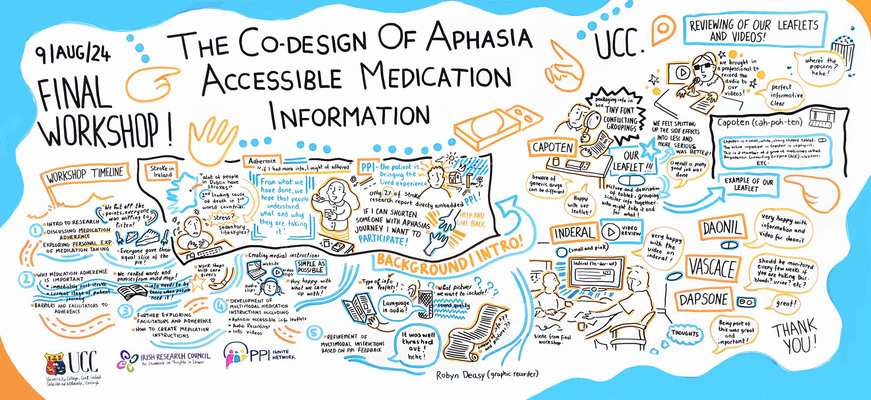In This Section
- PPI Case Studies
- PPI Resources
- Introduction to PPI
- Difference between PPI and qualitative research
- Involving children and young people in research
- PPI and doctoral research
- PPI in systematic reviews
- PPI in qualitative analysis
- Reporting PPI
- PPI in funding applications
- Budgeting for PPI
- PPI and lab-based research
- Evaluating PPI
- Events and Seminars
- Previous Summer Students
- News and Events
- About Us
- PPI Seed Funding Scheme 2023
- PPI Shared Learning Group for PhD Researchers
- PPI Ignite Network@ UCC Mailing List
- Digital Badge
Development of Accessible Medication Information for People with Aphasia

People living with aphasia partnered with UCC researchers to redesign how medication instructions are written and shared. Together, they created easy-to-understand, visually accessible materials.
Project Summary
Affecting more than on in three people who experience a stroke, aphasia is an acquired communication disorder, which affect’s a person’s language production, comprehension, and/or literacy. Medicines play a central role in the management and treatment of stroke, yet people with post-stroke aphasia are at higher risk of medication non-adherence due to communication barriers and lower health literacy.
This research, part of a larger PhD project at University College Cork, aimed to address this gap by co-designing aphasia-accessible medication instructions. People with aphasia were invited to join a patient and public advisory panel. Three people with different types of aphasia (mild-moderate in severity) guided and advised through a series of interactive workshops and co-designed aphasia-accessible medication instructions.
The final output consists of a set of multimodal medication instructions designed to improve accessibility for people with aphasia. Key features include:
- Medication Identification: A description of the medication’s appearance and its active ingredient, along with an explanation of its function and therapeutic purpose.
- Usage Instructions: Clear guidance on when and how to take the medication, including meal timing, swallowing instructions, and steps to follow if a dose is missed.
- Eligibility Criteria: A list of conditions for which the medication may be prescribed, as well as contraindications, such as certain health conditions or allergies.
- Side Effects: Categorized lists of potential side effects, distinguishing between common, less common, and serious reactions, with instructions on when to seek medical advice.
- Drug Interactions & Monitoring: Information on potential interactions with other medications and the importance of consulting a healthcare provider before making changes to treatment.
- Healthcare Guidance: Emphasis on adherence to medical advice, the need for continued medication use even if symptoms improve, and encouragement to consult a doctor or pharmacist with any concerns.
The materials are explicitly labelled as a research tool and does not replace professional medical guidance. This format aligns with the co-design principles established during the workshops, ensuring that the materials are both user-friendly and responsive to the needs of people with aphasia. See example of video materials co-designed with PPI Partners here - https://youtu.be/JobIOmFgvPo
